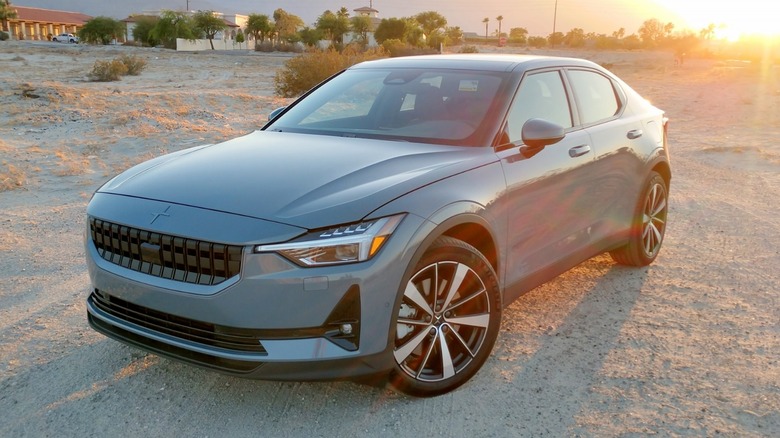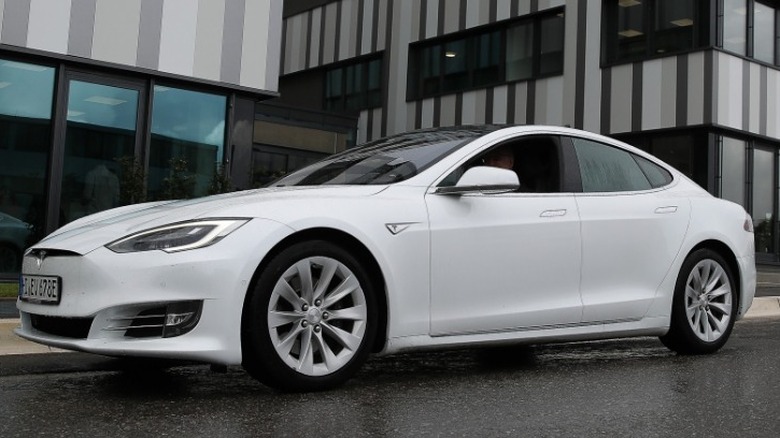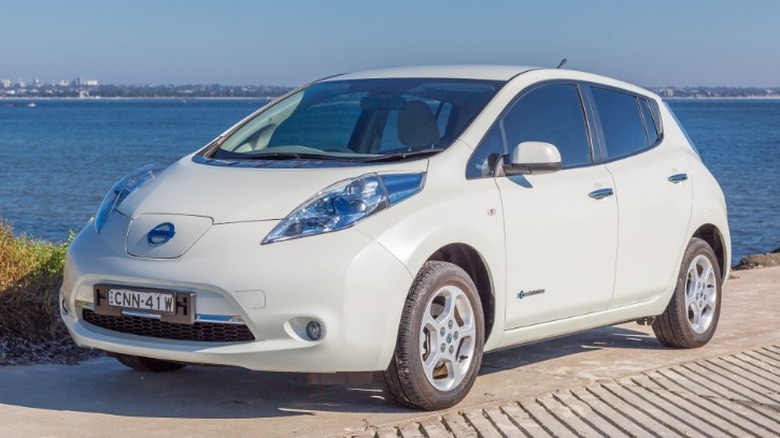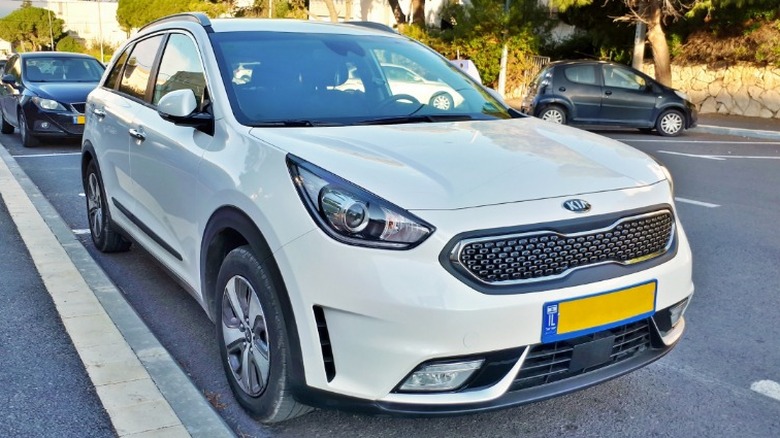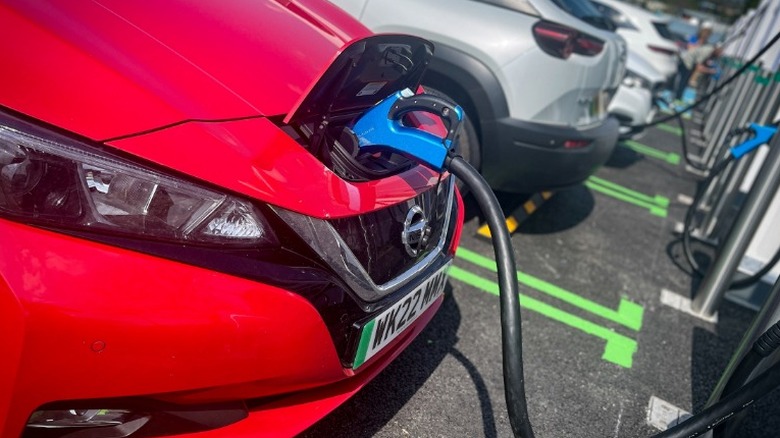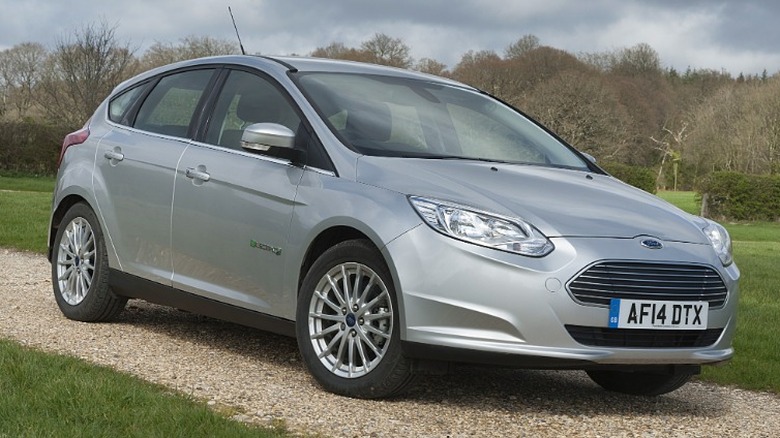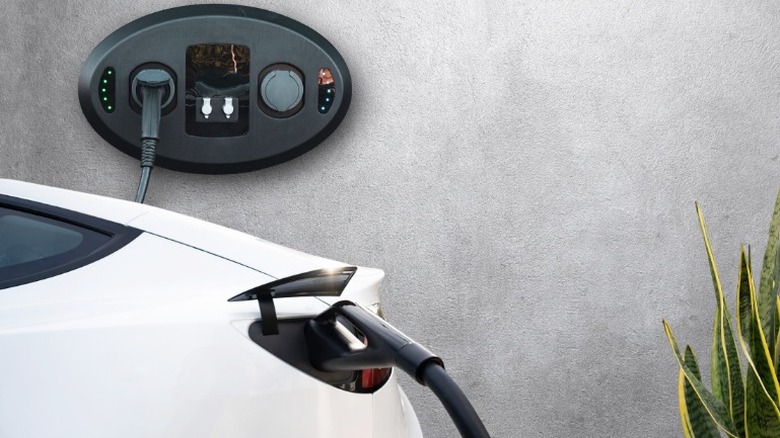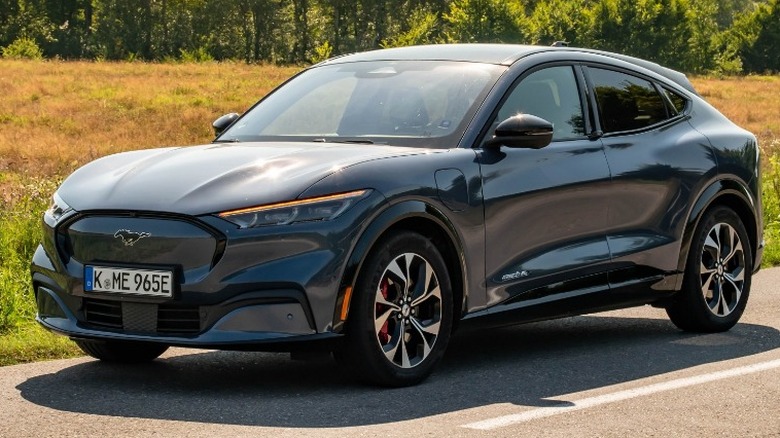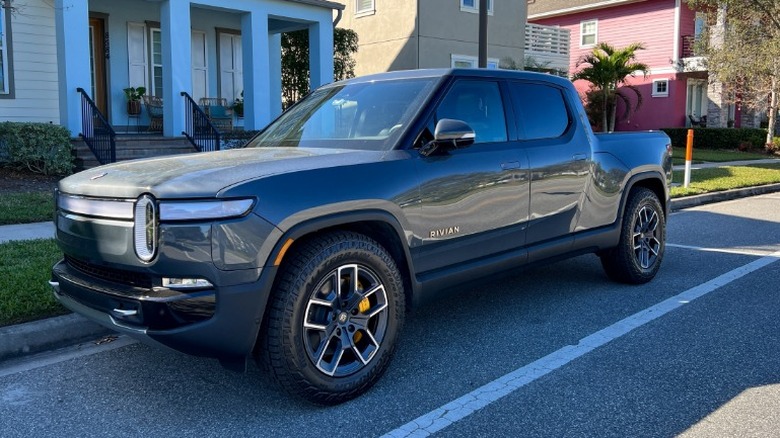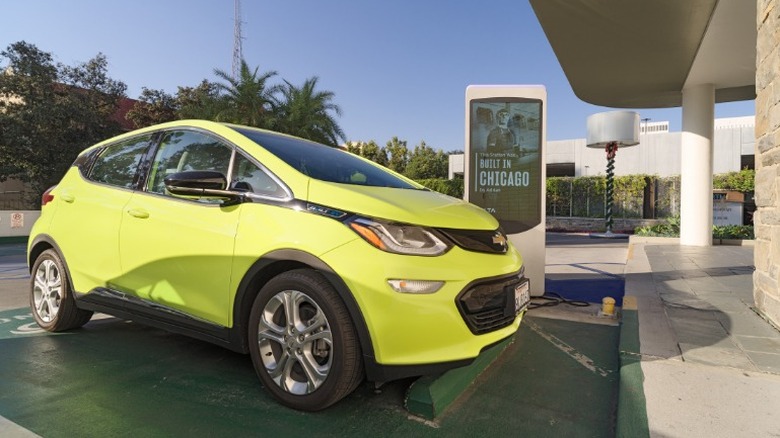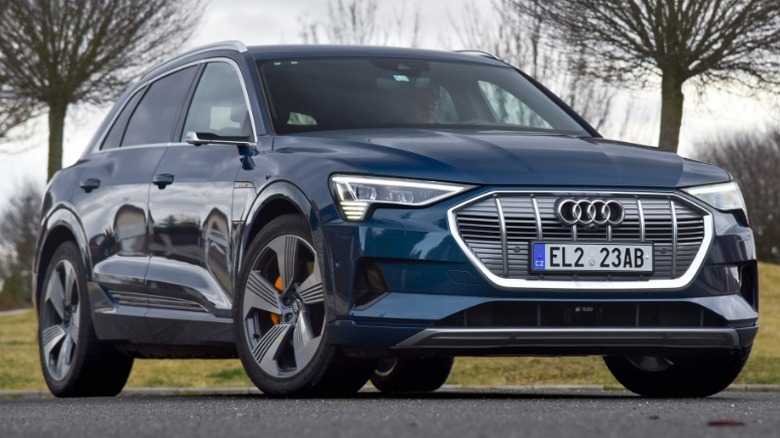10 Key Questions When You're Buying A Used Electric Car
We may receive a commission on purchases made from links.
It is obvious to anyone that the rising adoption of the electric vehicle is a trend not likely to wane any time soon. The EV is looking more like the future of personal transportation every day. While there are pros and cons to the proliferation of EVs, choosing to purchase one is a personal decision that everyone has to figure out for themselves ... for now. There is also much disinformation and bad advice going around for any used car. But for those who have already decided that obtaining an EV is right for them, there is a lot to consider. With manufacturers introducing new electric models every year, the options have become broad and varied, offering nearly everyone some model that will work for them. However, EVs are still expensive. Until the technology catches up and significantly lowers the cost, a used electric car is an option.
Since Tesla and others paved the way for broad acceptance of EVs and developed new technologies to make it possible to have an electric car capable enough for everyday use, the used market is good. The Nissan Leaf has been around for more than a decade and Hyundai/Kia and others have been selling EVs for several years now. Most people know what to look for in gas-powered cars, but may need help choosing a used EV. So, for anyone considering the purchase of a used electric car, here are 10 key questions to ask before buying a used one.
How are the maintenance records?
While electric cars have a fraction of the moving parts of conventional cars, they are not maintenance-free. There are still parts that can wear and break and need proper attention when things go a bit sideways. Air conditioning, door trim, and power windows are among the things that can commonly break. Furthermore, an EV may not need oil changes, but may need brake service and will definitely need tires at some point.
Just like with an internal combustion car, an EV with a thorough maintenance record is more desirable than one without. It can inform you if something that is a common problem has already been addressed or if the previous owner put things off. Furthermore, if the records include invoices from service jobs, you can also get a fair idea of what trips to the shop may cost with a particular model. This is just good general advice for any car. Find one with a good record of its history.
Does a battery warranty remain?
The latest battery technology has significantly advanced over the last few decades. While an impressive amount of range can be derived from these batteries, longevity is equally impressive. However, batteries can degrade over time and problems can arise to cause significant malfunctions. Furthermore, replacement batteries are very expensive and costly to replace. The good news is that generous warranties cover most of them.
New electric vehicle manufacturers, according to Green Cars, offer warranties on the battery pack from eight to 10 years and for mileage of 100,000 or more. Some of them only cover a complete failure of the battery pack while others, such as Tesla and Nissan, cover batteries with reduced capacity. However, batteries generally will only be covered after degrading a certain percentage. Batteries with more than 70% capacity usually will not qualify. The best thing to do is research the policy of the manufacturer and verify using the VIN if any warranty coverage remains.
How much range do I need?
In deciding to purchase any car, its purpose will be paramount to making the right decision. A subcompact should obviously be the wrong choice for a family just as much as a sports car is ill-suited for doing the work of a plumber. The vast majority of car buyers need something to commute to work with that can also carry a family and haul a bit of cargo. Fortunately, EVs are increasingly coming in varied configurations to handle the needs of a broad range of consumers. Therefore, you need to assess your needs first.
Chief among the requirements to look for in an electric car is its range. This is especially prescient for commuters. In some cities, commutes to a downtown office can easily exceed 50 miles, and this is also an issue for rural folks who live in spread-out communities. Conversely, those who live close to work or work at home can make do with relatively limited range. For the most part, a car that can handle an average day's driving without needing a recharge should work well. For most people, this is far less than the nearly 300 miles offered by a Tesla, but can be much more than the sub-100 mile range of an older Nissan Leaf (via Carscoops). In 2021, Car and Driver reported on a new service to help evaluate the life of a battery called Recurrent. Although the car has a readout of available range, the longevity of the battery is affected by many factors that this tool may help evaluate.
Is my local charging network adequate?
The ability to charge your car is a primary concern. Tesla pioneered the convenience of EV charging with its Supercharger network and other companies have stepped in to cover other makes and models. One of the biggest benefits of EV ownership is the ability to charge overnight and skip the filling station altogether, but there will be times when a little more juice will be necessary.
The availability of chargers should be no issue in any of the major cities in North America, such as Chicago, Dallas, Miami, or Toronto. Anywhere there is a large population, there will be plenty of chargers, especially within the central parts of the city. Things can get spotty in the suburbs further away from the densely populated areas, but should still be adequate around larger metropolitan areas. It will get more difficult to find convenient charging in smaller cities like Omaha or Tulsa, but decent charging networks still exist. Perhaps the biggest roadblock to widespread EV adoption is and will be rural areas. It will take some time for networks to be fully integrated and available to populations of small towns and spread-out counties. Before making a purchase, check PlugShare.com. This website offers an interactive map displaying EV chargers throughout the entire planet.
How often do I travel?
Taking your car on a road trip is an American tradition, and the infrastructure for cross-country driving is well-established. Using an EV for long trips presents unique challenges. While Tesla offers a robust network of Superchargers that can increase range quickly and conveniently, they are expensive cars. Tesla models also retain their value, making used ones still rather expensive. For most working people, something more modest and practical is needed. There are still ample charging networks across the country other than Tesla, but travel will still be a consideration.
Most people take long trips only occasionally to see family or for vacation. Until the technology and associated infrastructure mature, owning an EV could be a bit of a problem for those occasional road trippers. However, if an electric car can provide cost savings in fuel, an occasional excursion could be made with a rental. For regular travelers who want to go electric, you will have to choose a car with enough range, which still includes many used EVs.
For perspective, InsideHook published an article detailing the experience of one Minnesotan in a Volkswagen ID.4 traveling throughout the country. While the fears over range anxiety turned out to be mostly unfounded, trips did require more planning than usual to ensure chargers would be available. Fortunately, most, if not all, EVs will map routes with chargers automatically, making the experience hassle-free.
Can I install a home charger?
Home charging is available for anyone with access to a standard residential plug. This is, of course, a challenge to apartment dwellers. For them, reliance on public charging stations is the only option, except for complexes with EV charging or available exterior electrical plugs. Charging through ordinary plugs is called Level 1, and is very slow, with a full charge on most cars being up to 12 hours. The fastest charge is at a public DC fast charger that tops up the range in about half an hour but is not possible to install in a residential setting as the voltage is significantly higher than most residential electrical systems (via Charged Future).
It is conceivable you can have an AV and rely solely on public chargers with no problems. It will require some time set aside for charging, but with many areas for shopping offering charge points, it can coincide with other errands and pose almost no inconvenience. With an available home outlet, such as in your garage, overnight charging should provide ample range for most commutes. And for homeowners with a garage or designated parking, installation of a Level 2 charger can be done for $700-$2,000 (via WattLogic), preventing the need for a public charger almost completely.
Does the car have charging equipment?
A new car should come with everything needed for trouble-free ownership, including what is needed for charging. However, the used car market is a bit different. It will be important to make sure the car has the proper charging cable with it at purchase, and if not, you should use that to negotiate the price as charging cables and accessories can be rather expensive.
The market for EV accessories is a growing one. Amazon lists a wide variety of charging cables ranging in price including Level 1 cables for around $150 and Level 2 cables that plug into any standard 240V outlet for up to $700. Forbes has also listed what it calls the best Level 2 chargers that would be installed into your garage with a range from $600-$900, with a variety of features and power management options. A few questions asked before signing any documents can save a lot of headaches after getting your used EV home.
Where can it be serviced?
Even though EVs have fewer systems to be serviced, they still need to be checked by a technician at regular intervals and also need repairs sometimes. While Tesla is the trailblazer and most prominent EV manufacturer, many complaints of quality issues have come up over the years. Any machine or device with moving parts and sensitive electronics is prone to damage and malfunction. Having a shop nearby is important.
Tesla service centers are all over the country, but only in large cities as of this writing. These will be harder to access for EV owners in rural areas and far-flung suburbs. For these buyers, sticking with a brand with a local presence, such as Ford or Chevrolet, is probably advisable. One caveat to the rural dealer is that the shop likely does not have trained technicians for electric cars unless they sell them regularly. Dealer support is also a must if the car is still covered by warranty.
Independent shops are few and far between right now. Wards Auto expects this to change as EVs become more widespread, and they advise repair shops to look forward to the day when EVs will make up a large enough part of their business to invest in tools required for electric drivetrains. In many instances, when a dealer is advised to replace an entire battery pack that has malfunctioned, a savvy repair technician can isolate dead cells and bring the assembly back to life for a fraction of the cost. Having a specialist in your area will help.
What EV incentives exist?
The federal government tax credit of $7,500 for the purchase of a new electric vehicle has been around for a long time, despite being a political punching bag. The good news for buyers of used electric cars comes with the recently passed Inflation Reduction Act, which extends a $4,000 tax credit to used cars, but with a few qualifying rules.
According to Leaf Score, the vehicles that qualify must cost less than $25,000, be more than two years old, and be sold by the original owner — this excludes anything sitting on a dealer's lot. Buyer qualifications also exist as they must earn less than $75,000 per year if single and $150,000 if married filing jointly. Furthermore, the credit can only be applied once every three years. Some states also offer credits for used EVs, such as Connecticut, which offers up to $3,000 with income qualifiers, according to Kelley Blue Book. Additionally, many power companies around the nation offer rebates for installing Level 2 charging stations in your home that can get you an additional $200 to $1,000.
What are the insurance costs?
Something important to consider before committing to buying any car, new or used, should be the cost to insure it. For buyers who are young and single, it can be a deciding factor in which model to purchase. The cost of insurance bears considerably on consumers who are price sensitive. It would be tragic to pick up the perfect car just to find out you will be sunk by insurance costs, risking repossession from being overburdened by its cost. This sort of calamity can be overcome with a little research.
Electric cars are more expensive to insure. Money Geek says this is because of a few things. Parts can be expensive and hard to obtain, and factory repair manuals often require replacing components instead of repairing them. Electric car parts are covered with sensors that are often more prone to damage than other parts. Due to a combination of these costly reasons for higher insurance, electric cars are also more prone to being totaled by an insurance adjuster. Insurance rates for Tesla are particularly high, but the increase affects EVs of any stripe, with additional costs over gasoline-powered cars ranging from about 9% for a Mach-E Mustang to a shocking 41% for the Volvo XC40 Recharge.
